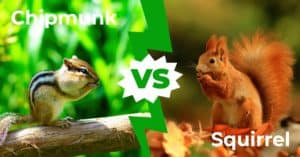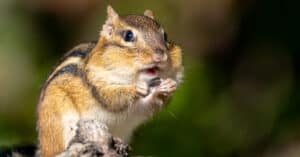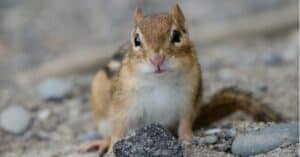When you see one of these litter critters dash across the yard, you may wonder exactly what chipmunks eat that makes their cheeks looks so full, or you might just think of Alvin and his brothers, Simon and Theodore. These adorable cartoon characters are certainly entertaining but aren’t exactly indicative of what actual chipmunks are like.
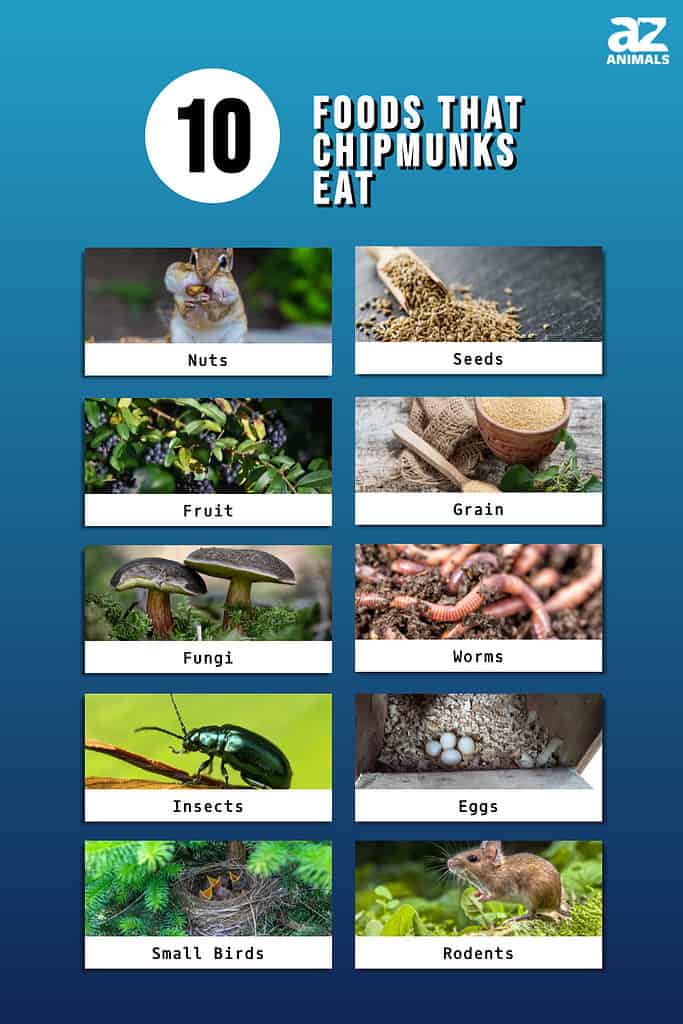
Chipmunks are rodents belonging to the family Sciuridae. They are native to North America, although another species, the Siberian chipmunk, is also found in Asia. It’s easy to spot a chipmunk by the distinctive stripes that run across its back. The term chipmunk likely comes from the native Odawa language, and translates roughly to “red squirrel.” Over the years, they have also been known as striped squirrels, timber tigers, or ground squirrels. Chipmunks are a fairly common sight in North America, and many people associate them with playfulness and fun. However, while they are certainly well-known creatures, few people can answer the question, “what do chipmunks eat?”
In this article, we’ll answer this question for you and many more about chipmunks. We’ll start off with a high-level discussion of what chipmunks like to eat. Then, we’ll talk about how chipmunks hunt and forage for food. Next, we’ll compare what chipmunks eat in the wild versus what they eat as pets. Finally, we’ll end with a brief introduction to what baby chipmunks eat. So, let’s get started and tuck into the question, “what do chipmunks eat?”
What Do Chipmunks Like to Eat?

Chipmunks are omnivores, meaning they eat both plant and vegetable matter. Their diet largely consists of seeds, nuts, fruits, grains, insects, worms, and fungi. They are not known to be picky eaters, although they may show preference towards certain foods. While they do eat animal protein, plants make up the bulk of a chipmunk’s diet. That said, chipmunks are opportunistic feeders, and will eat whatever they can stuff into their cheeks. Therefore, they tend to eat a wide variety of foods. In addition, chipmunks live in various habitats, although they typically live in forested environments. As such, the foods they eat can vary depending on where they live. However, generally speaking, there are several foods that most chipmunks like to eat. We’ve identified 10 foods that chipmunks frequently like to eat both in the wild and in captivity. While there’s no way of knowing just how much chipmunks like these foods, it’s safe to assume they’re the favorites. These 10 foods include:
- Nuts
- Seeds
- Fruit
- Grain
- Fungi
- Worms
- Insects
- Eggs
- Small birds
- Other rodents
How Do Chipmunks Hunt and Forage for Food?
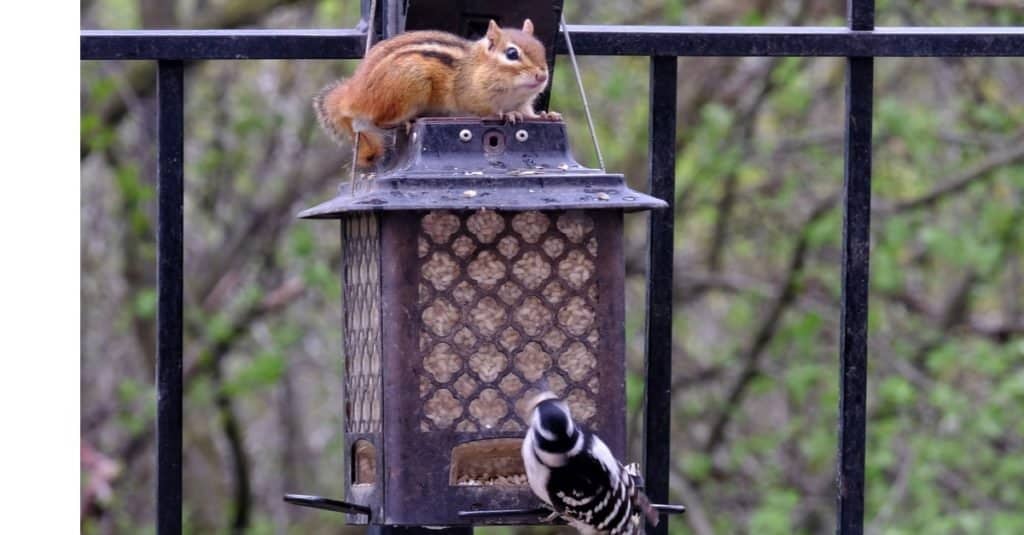
Chipmunks rely on their excellent eyesight and keen smell to find food.
©Nancy Salmon/Shutterstock.com
Chipmunks possess the same senses as humans and rely on their senses to find food. That said, while they can see, smell, taste, touch, and hear, they use certain senses more than others, particularly when searching for something to eat. By far, a chipmunk’s most useful senses for finding food are sight and smell. Chipmunks process visual information very quickly, which allows them to see things clearly in “slow motion.” They can detect motion well, which enables them to both escape predators and hunt for food. However, their sight is limited during the night, so you’ll mostly only see them during the day. Meanwhile, their sense of smell is also quite potent, and they often rely on their olfactory senses to find and distinguish different foods. While they do use touch, taste, and hearing to survive, these senses are less useful when finding food.
Chipmunks are diurnal, meaning that they are most active during the day. When awake, chipmunks spend most of their time foraging for food on the ground. While foraging, they will look under rocks, logs, and bushes to find food. This enables them to not only find the food they need but also to avoid predators at the same time. Upon finding food, chipmunks will either eat what they find or save some food for the lean winter months. Any food that is saved is either stored in the chipmunk’s burrow or buried in a safe spot underground. Additionally, chipmunks will often pack extra food inside their cheeks to be eaten later. Their cheeks can stretch up to three time’s larger than their head and act as a form of built-in storage container. Along with foraging, chipmunks will also hunt for insects and scavenge for eggs and small, vulnerable animals.
What Do Chipmunks Eat in the Wild?
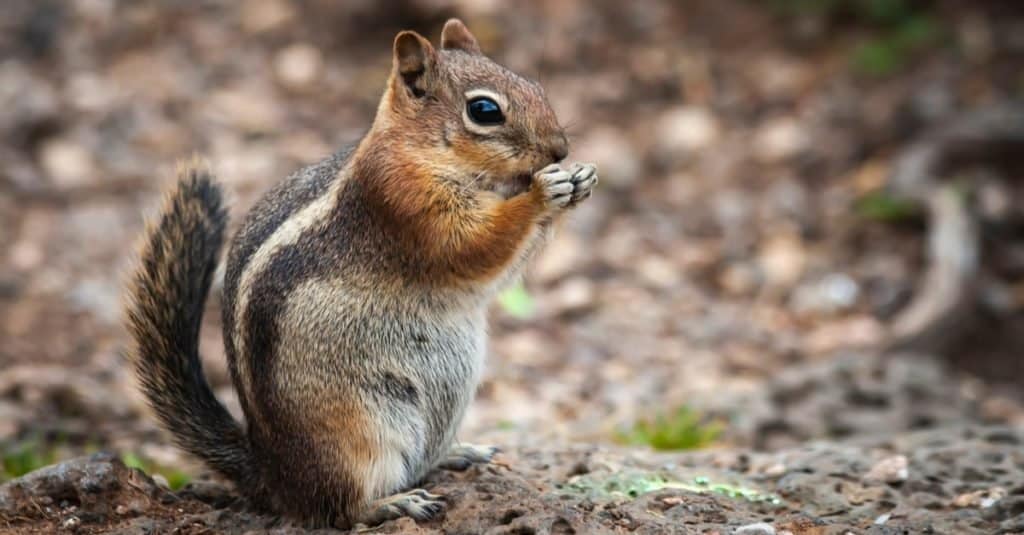
In the wild, chipmunks will eat pretty much anything that they can find.
©Cindy Larson/Shutterstock.com
What do chipmunks eat in the wild? They will eat pretty much anything that they can find. As opportunistic omnivores, they will eat both plants and animal protein when it’s available. When it comes to plants some of the foods they eat most often include seeds, nuts, fruits, grains, and mushrooms. They particularly like nuts and will gather up acorns and pecans with relish. If food is scarce, chipmunks will also eat grasses, shoots, and roots in order to survive. Along with plant matter, they will also hunt for live prey. Some of their favorite prey includes insects and arthropods like worms, centipedes, and millipedes. Occasionally, wild chipmunks will also eat the eggs of birds or even baby birds themselves. Rarer still, they will occasionally prey on smaller rodents, frogs, and even snakes. Generally speaking, if an animal is smaller than a chipmunk and has an easy meal, a chipmunk will eat it.
What Do Pet Chipmunks Eat?
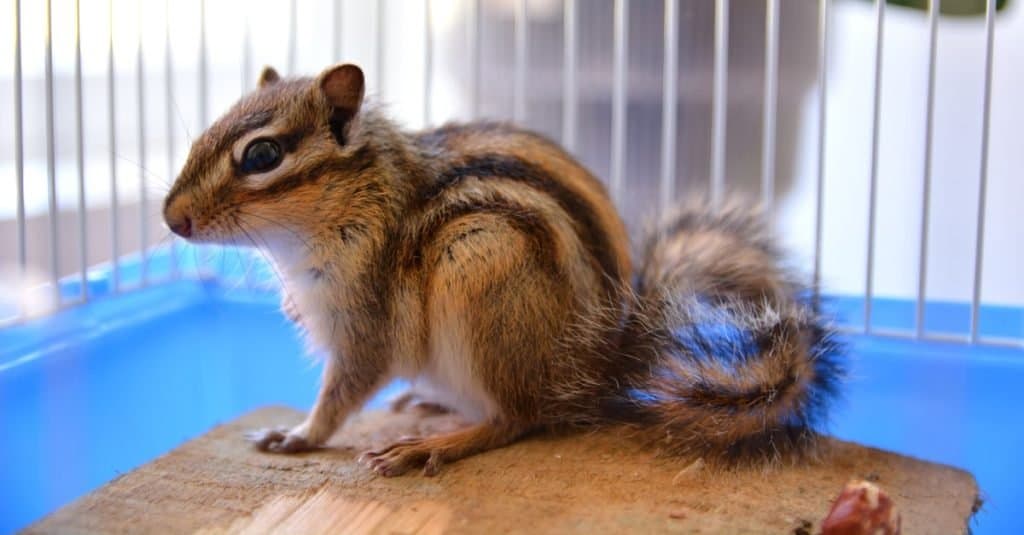
Grains, cereals, nuts, seeds, and fruits will make up the majority of a pet chipmunk’s diet.
©Emmily/Shutterstock.com
Due to their cute appearance and lively nature, some people opt to keep chipmunks as pets. If you decide to keep a chipmunk as a pet, you’ll want to make sure you feed it a proper diet. To stay healthy, a chipmunk will require a mix of grains, fruits, nuts, and vegetables, as well as plenty of water. Generally speaking, grains and cereals such as oats, barley, corn, millet, and wheat. You can also provide a pet chipmunk with nuts such as acorns, pine nuts, pecans, and hazelnuts. Chipmunks may eat a small amount of fresh fruit such as apples, berries, pears, or bananas. Optional vegetables include carrots, sweet potatoes, bean sprouts, and leafy greens. Some owners opt to feed their pet chipmunk a pellet diet suitable for rodents. If you go this route, you’ll want to consult with an expert to ensure the formula is right for your chipmunk.
What Do Baby Chipmunks Eat?
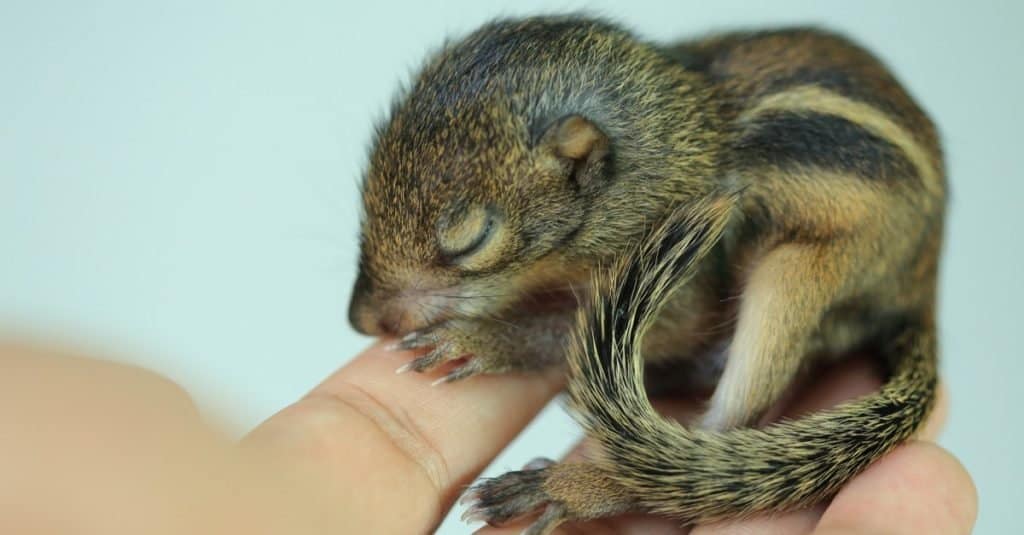
Chipmunk babies measure only around the size of a bean when born.
©wanpapha sichana-in/Shutterstock.com
Baby chipmunks, or pups, are born blind and measure around the size of a bean. At first, baby chipmunks rely on their mother’s milk and the food she finds to survive. After around two months, young chipmunks are old enough to venture out on their own. If you are raising a baby chipmunk, you can feed it a puppy milk replacer. You can typically purchase this from your vet’s office or a local pet store. Once a baby chipmunk is around a month old, you can start to feed it soft, solid foods. Start with soft fruits like apples or berries. You can also introduce softened pellet formulas suitable for rodents. Eventually, you can start to add things like seeds, nuts, and veggies to your baby chipmunk’s diet. Ultimately, its diet should consist of 50% nuts and grains, 35% to 40% fruits and veggies, and 10% to 15% rodent supplement.
Summary of 10 Foods That Chipmunks Eat
| Foods Chipmunks Eat | |
|---|---|
| 1 | Nuts |
| 2 | Seeds |
| 3 | Fruit |
| 4 | Grain |
| 5 | Fungi |
| 6 | Worms |
| 7 | Insects |
| 8 | Eggs |
| 9 | Small Birds |
| 10 | Rodents |
The photo featured at the top of this post is © iStock.com/flySnow
Thank you for reading! Have some feedback for us? Contact the AZ Animals editorial team.



